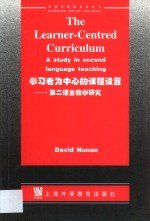

学习者为中心的课程设置 第二语言教学研究 英文版PDF电子书下载
- 电子书积分:9 积分如何计算积分?
- 作 者:(美)David Nunan著
- 出 版 社:上海:上海外语教育出版社
- 出版年份:2001
- ISBN:7810802879
- 页数:196 页
1 Introduction 1
1.1 Preamble 1
1.2 Linguistics and Language Teaching 1
1.3 Learner-Centred Curriculum Develipment 2
1.4 The Curriculum Process 4
1.5 The Structure of the Study 8
1.6 Conclusion 9
2.1 Traditional Approaches to the Curriculum 10
2 Curriculum Processes 10
2.2 ESL and Curriculum Planning 15
2.3 Summary 20
3 Learner-Centred Curriculum Development 21
3.1 Introduction 21
3.2 Theoretical Bases for Learner-Centred Curricula 22
3.3 Communicative Language Teaching and Learner-Centred Curricula 24
3.4 Communicative Language Teaching-The Teacher's Perspective 28
3.5 The Concept of Language Proficiency 32
3.6 Towards a Generalised Language Curriculum Framework 35
3.7 The Teacher and the Curriculum 36
3.8 Summary 41
4 Pre-Course Planning Procedures 42
4.1 Introduction 42
4.2 The Starting Point 42
4.3 Needs Analysis 43
4.4 Participants Pre-Course Planning Procedures 45
4.5 Griping Learners 46
4.6 Resources for Planning 48
4.7 Investigating Needs-Analysis Procedures 51
4.8 Conclusion 52
5 Planning Content 54
5.1 Introduction 54
5.2 Content Selection-An Empirical Investigation 55
5.3 Analytical Approaches to Content Specification 57
5.4 Deriving Content from Learner Data 62
5.5 Conclusion 75
6.1 Introduction 76
6 Methodology 76
6.2 Methodology and Communicative Language Teaching 78
6.3 Acquisition in the Classroom 81
6.4 Stimulating Classroom Acquisition 84
6.5 Methodology in a Learner-Centred Curriculum 88
6.6 Negotiating Leaning Activities 95
6.7 Conclusion 97
7.1 Introduction 98
7 Resources for a Learner-Centred Curriculum 98
7.2 Materials in a Learner-Centred Curriculum 99
7.3 The Community as a Resource 105
7.4 The Teacher as Developer of Resources 108
7.5 Conclusion 115
8 Assessment and Evaluation 116
8.1 The Place of Evaluation in the Curriculum 116
8.2 Some Key Concepts in Evaluation 118
8.3 some Key Questions in Evaluation 121
8.4 The Assessment of Second-Language Proficiency 123
8.5 Techniques for Self-Assessment 130
8.6 Conclusion 134
9 Evaluation and Professional Development 136
9.1 Introduction 136
9.2 Evaluation and the Planning Process 137
9.3 Evaluation and the Implemented Curriculum 138
9.4 Evaluation and the Assessed Curriculum 142
9.5 Causes of Leaner Failure 144
9.6 Evaluation and Teacher Development 147
9.7 Conclusion 150
10 The Teacher as Curriculum Developer 151
10.1 Introduction 151
10.2 The Teacher as Curriculum Developer-A National Study 151
10.3 Future Directions 174
10.4 Conclusion 178
References 181
Appendix 187
Subject Index 191
Author Index 195
- 《红色旅游的社会效应研究》吴春焕著 2019
- 《汉语词汇知识与习得研究》邢红兵主编 2019
- 《生物质甘油共气化制氢基础研究》赵丽霞 2019
- 《东北民歌文化研究及艺术探析》(中国)杨清波 2019
- 《联吡啶基钌光敏染料的结构与性能的理论研究》李明霞 2019
- 《异质性条件下技术创新最优市场结构研究 以中国高技术产业为例》千慧雄 2019
- 《培智学校义务教育实验教科书教师教学用书 生活适应 二年级 上》人民教育出版社,课程教材研究所,特殊教育课程教材研究中心编著 2019
- 《《国语》和《战国策》词汇比较研究》陈长书著 2017
- 《中国制造业绿色供应链发展研究报告》中国电子信息产业发展研究院 2019
- 《中央财政支持提升专业服务产业发展能力项目水利工程专业课程建设成果 设施农业工程技术》赵英编 2018
- 《培智学校义务教育实验教科书教师教学用书 生活适应 二年级 上》人民教育出版社,课程教材研究所,特殊教育课程教材研究中心编著 2019
- 《习近平总书记教育重要论述讲义》本书编写组 2020
- 《办好人民满意的教育 全国教育满意度调查报告》(中国)中国教育科学研究院 2019
- 《教育学考研应试宝典》徐影主编 2019
- 《语文教育教学实践探索》陈德收 2018
- 《家庭音乐素养教育》刘畅 2018
- 《学前教育学》王换成主编 2019
- 《近代体育游戏教育史料汇编 第1辑 1》王强主编 2016
- 《全国学前教育专业(新课程标准)“十三五”规划教材 简谱手风琴教程 第2版》(中国)杨克勤,王宝庆 2019
- 《现代教育技术》李志河主编 2019
